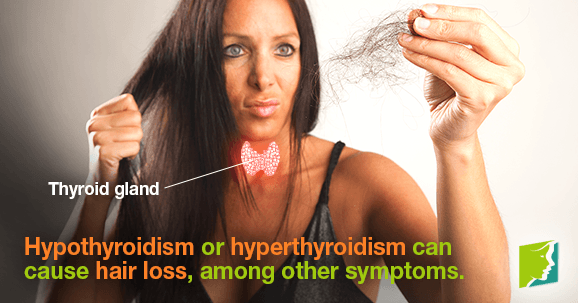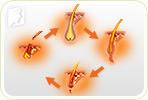Most people lose around 100 strands of hair from their head every day. This may sound a lot, but it is completely normal shedding, and unlikely to be noticeable. When hair loss is noticeable, however, it can be a problem. Some women find it distressing to experience hair loss, and it's important to take the issue seriously and consider what it could be the best. Hair falling out easily when handled, becoming thin and brittle, and the appearance of bald patches on the scalp could be indicative of health concerns elsewhere in the body, such as a thyroid disorder.

What Does the Thyroid Do?
The thyroid gland is located at the front of the neck, just above where the collarbones meet. It is an essential part of the endocrine system; the thyroid stores and releases T3 and T4 around the body - the hormones that control the way cells use energy (i.e., how fast calories are burned) in a process known as metabolism. When the thyroid produces too few or too many hormones, this has a ripple effect on metabolic activity in the body, which can result in hair loss, among other symptoms.
Hypothyroidism
Hypothyroidism is more commonly known as an underactive thyroid. This is a disorder that affects between 6 - 10% of women, wherein the thyroid does not produce enough T3 and T4. Hypothyroidism is usually caused by inflammation of the thyroid that damages the gland's cells and inhibits hormone production - derived from viruses, a weakened immune system, and pregnancy. The disorder causes hair loss, hair thinning, and brittle, breakable hair. Other symptoms of hypothyroidism include:
- Fatigue
- Weakness
- Weight gain
- Muscle pain
- Constipation
- Irregular periods
Hypothyroidism is diagnosed with a physical exam - to assess external symptoms and swelling in the thyroid - and a blood test, to examine hormone levels. Treatment is then aimed at regulating levels of the missing hormone on a long-term basis.
Hyperthyroidism
Hyperthyroidism may sound similar to hypothyroidism, but it is essentially the opposite. Hyperthyroidism refers to an overactive thyroid, which is less common than hypothyroidism, but can also cause hair to fall out and become brittle and thin. Other symptoms of an overactive thyroid include:
- Excessive sweating
- Nervousness and restlessness
- Weight loss
- Increased appetite
- Frequent bowel movements
The condition is diagnosed in the same way as hypothyroidism, and treatment is usually long-term hormone-regulating medications. However, in extreme cases, when symptoms are debilitating, thyroid removal surgery is an option.
Thyroid Nodules
Thyroid nodules occur when sections of the thyroid become swollen. They can be solid or filled with liquid or blood. Hair loss is not a common symptom of thyroid nodules; in fact, these are largely symptom less, though sometimes the outline of a nodule can be seen when standing in profile. In 90% of cases, thyroid nodules are benign, but it is worth having them examined by a doctor because there is a chance the nodules could be cancerous, although thyroid cancer is very rare.
Hair loss may affect your self-image, but try to stay positive, as stress exacerbates hair loss. Focus on recovering your thyroid health with your doctor; your hair will grow back in time. In the meantime, regain your confidence by boosting the condition of the hair you do have with herbal products and natural treatments. If your sense of femininity has taken a hit, rebuild it by emphasizing other fantastic parts of your appearance. Remember: your hair is not what defines you as a woman - your inner beauty is.
Sources
- Better Health Channel. (2011). Thyroid - hypothyroidism. Retrieved March 25, 2014, from http://www.betterhealth.vic.gov.au/bhcv2/bhcarticles.nsf/pages/Thyroid_disorders_hypothyroidism
- National Cancer Institute. (2012). What You Need To Know About Thyroid Cancer. Retrieved March 25, 2014, from http://www.cancer.gov/cancertopics/wyntk/thyroid/page1/AllPages/Print
- National Health Service UK. (2012). Hair loss - causes. Retrieved March 25, 2014, from http://www.nhs.uk/Conditions/Hair-loss/Pages/Causes.aspx
- National Health Service UK. (2012). Overactive thyroid - Symptoms. Retrieved March 25, 2014, from http://www.nhs.uk/Conditions/Thyroid-over-active/Pages/Symptoms.aspx
- National Institutes of Health. (2013). Hypothyroidism: MedlinePlus Medical Encyclopedia. Retrieved March 25, 2014, from http://www.nlm.nih.gov/medlineplus/ency/article/000353.htm
- Office on Women's Health. (2012). Thyroid disease fact sheet. Retrieved March 25, 2014, from http://womenshealth.gov/publications/our-publications/fact-sheet/thyroid-disease.html



